The man with his eyes wide open and his heart on his guard
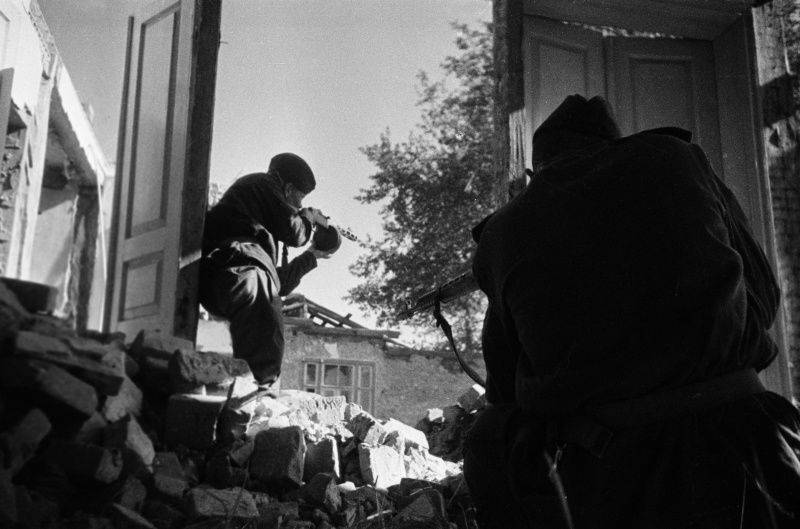
He wrote his last book almost without seeing the half-blind man displaying the title: "When the banners were uncovered". She left already without him. “The war is stubbornly“ catching up ”with me, and hidden illnesses seem to be just waiting for the right moment to finally deal with me. I thought that this manuscript would be the most important book of mine. This is a confession about my youth, about the military youth of my peers.” .
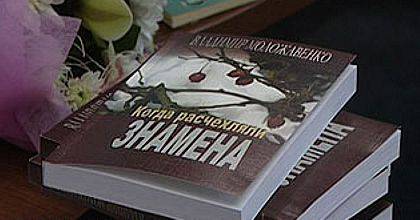
The sharp drop in the status of a journalist is today's reality. But among us were amazing people who became the glory of Russian journalism, tempered in battles and life trials, leaving behind a unique literary heritage. One of them - Vladimir Molozhavenko, whose work with piercing clarity conveys the events of the war and post-war time.
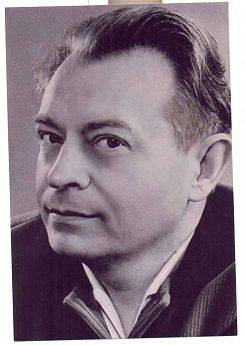 December 28 to a writer, a member of the Writers' Union and the Union of Journalists of Russia, the Don regional specialist V. S. Molozhavenko would have turned 90 years. He was called a man with wide eyes and a heart on his guard. How did the formation of a man take place, what influenced his character, why did he become so, and not different? I look for answers to these questions in the work of Vladimir Molozhavenko. Today we need to remember such people who have become the national treasure of the country, they need to search and find the foundations of Russian spirituality, which over time can be lost and never returned.
December 28 to a writer, a member of the Writers' Union and the Union of Journalists of Russia, the Don regional specialist V. S. Molozhavenko would have turned 90 years. He was called a man with wide eyes and a heart on his guard. How did the formation of a man take place, what influenced his character, why did he become so, and not different? I look for answers to these questions in the work of Vladimir Molozhavenko. Today we need to remember such people who have become the national treasure of the country, they need to search and find the foundations of Russian spirituality, which over time can be lost and never returned.Russian spirit. How does it begin, how does it harden, why did it become a legend and a basis for our life today? It seems that it is based on primordially Russian roots, which are nourished by unlimited kindness.
"A man without roots ceases to be a man"
25 April 2012 did not become a native of the village of Morozovskaya (now the city of Morozovsk), a participant in World War II, a member of the CPSU from 1945, a member of the Writers Union of the USSR from 1973, and later the Rostov regional branch of the Writers' Union of Russia, journalist Vladimir Semenovich Molozhavenko. The writer died in Rostov-on-Don, where he lived a significant part of his life, on the 88 year, after a long illness. October 23 2012 of the year on the facade of the house in which this famous person lived and worked, a memorial plaque was installed. After the writer's death, thanks to the Molozhavenko family, its funds, the two-volume Bulat published by the Rostov Publishing House (the first book “Memories of Memory”, the second book “The Magic World”, compiled by EG Dzhichoeva) was released, bringing together a number of selected works of the author. The new literary work is a summary of the work of Vladimir Semenovich.
Vladimir Molozhavenko was born on December 28 of 1924 in a large family of “aliens” to Don Matryona Semenovna and Semyon Varlamovich Molozhavenko in the Cossack village of Morozovskaya. This stanitsa began to actively develop after the construction of the Tsaritsyn-Likhaya railway branch in 1900, during which Morozovskaya became the junction station where the settlement was built, the basis of its economy was laid by entrepreneur Popov. On the bank of the river Bystra, a cast-iron foundry for repairing lobogreek and plows was first built, and then the enterprise grew every year and became a factory, and today it is the Morozovskselmash factory (part of the structures of the Novaya Sodruzhestvo owned by Konstantin Babkin).
Vladimir Semenovich reports on the place of his birth in the historical local history essay “Morozovsk”, written for the 40 anniversary of the city: “Fatherland is the city of Morozovsk, spread widely and freely in the Don steppe. More recently, he was called the village, on the streets of it and today you will see the old Cossack smoking. All the streets in this city go to the steppe. It surrounds it from all sides and it seems as if it comes to power itself on the square, in courtyards and levadas, smelled of hot sun, thyme and bitter wormwood. ”
Wormwood as the personification of the dear to the heart of the writer of the steppe region will be mentioned more than once in his work. In the same essay, he says that “the great-grandfathers chose the local steppes for their smoking, having fled from Khortytsya after the decree of Catherine the Second. For half a century, Varlam’s grandfather bent his back on the kulaks of the Belokobylskys and died in poverty - neither the stake nor the yard, and his children, without opening the primer, went to the farm laborers. ”
A worthy descendant of the Cossacks in love for the motherland is sincerely recognized: “The native land can do without any of us, but no one, absolutely no one can do without it. Because she is a mother, because in her are our roots, and a man without roots ceases to be a man. Each of us has such a land, and all our life we stretch towards it with our hearts, and when we meet we gain new strength. And the older a person becomes, the stronger his attachment to native places. Is that why I, having wandered a lot and traveled around the world, are also increasingly drawn to the Lukichev farms, lost in the boundless Don steppe, where my grandfather and great-grandfather, my father, were once born and lived. People who live in these parts are close to me - simple, hardworking and not indifferent. ”
It was not easy to live a hardworking and friendly family Molozhavenko, but fun. My father often told his son Vladimir about the life and exploits of the Zaporizhzhya Cossacks, their campaigns, and in the evenings the family loved to sing Ukrainian songs.
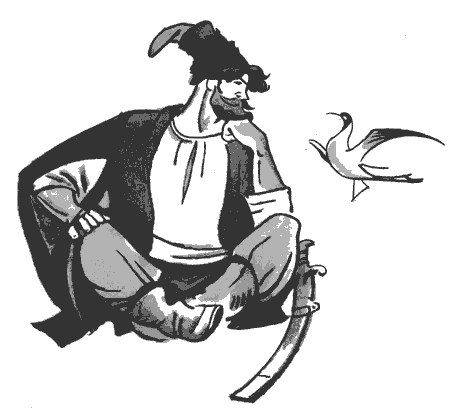
Grandmother Vladimir Semenovich knew much about the Zaporozhian Cossacks, which is also stated in the “Lukichevsky Chronicle” written by Molozhavenko: “I don’t want to say that my grandmother Praskovya was very much a devout one. She died in 47 year, when she was one hundred and twenty ninth year. And even though she was in her old age, she willingly told about the Cossacks: how they dressed, ate, what they were happy about, what they made fun of. Nades knew all the prayers. True, she remembered the gullish songs “Oi, not a witer in a field of grae, not an eagle in summer”, “Cossacks rose up,” and more about how the “bad luck” Sagaidachny traded his wife for tyutyun that cradle that would be more useful on the way than Zhinka. And sometimes she started a song about the awkward fate of the Sich, who never found their share on the Don. I listened to these songs, and the Cossack patrols on the mounds stood before my eyes, and sabers sounded, loud cries, hubbub, horse neighing seemed to be seen, covered with sweat and blood, poskonnye shirts of the warriors, who had fallen to death with the Turkish Khan. Neither the bullet nor the saber could knock them down because, as no one looked back. And then they walked afterwards, as if they were returning from the march, so walked, the grandmother said that for weeks the smoke stood like a rocker:
“There was our bow, Molojavenko, too,” she added.
I remember my grandmother once showed me the dugout dugout of our distant relatives living in the Sulinsky farm. There were a spinning wheel, a spindle, and remnants of yarn - from time immemorial the people of Lukiceva and the towels were woven themselves, and the bags and linen on the pants with their shirts. In the red corner there was an icon lamp next to the icon “Soothe my sorrows”, attached on wooden nails:
“You are not the teeth of your teeth,” she said. - Above the divine sin to laugh. God, he notices everything from above, he will not forgive anyone for offense.
“With bright and clean eyes we looked at the world”
In the chapter of the Lukichevsky Chronicle, which is called “Light cavalry is on the offensive”, the author recalls in detail the distant childhood: “With bright and clean eyes we looked at the world, and everything, absolutely everything was for each of us, then boys, ahead. Life seemed long and endless, and it was hard to believe that one day you would become old and sick. In our generation there was a lot of reverie and restlessness. He was eagerly listening to the story of the grandmother, that the rooster on his perch of the devils was guarding, as the morning sings, the "evil spirits" immediately scatter. At Dormition, the bushes of wormwood were dragged to their dugout, hung out in the hallway — also from “evil forces”; bundles of wormwood were dipped into a jug with milk, sprinkled on the road to please the mermaids — let the farm guys not be embarrassed. Those bundles of wormwood, which were hung in the passage, were rescued from fevers, and other diseases were treated. Wormwood broth still washed tubs for pickles, small children were bathed in it. Very useful, it turns out, the grass was ... "
In the chapter "There were a steppe way" this chronicle Molozhavenko explains the reasons for moving from Milyutinsky district to Morozovsky: "In the famine years, neither the Cossacks nor the peasant families avoided the universal misfortune: they threw the land and moved from the farms to work. They left for the Grushevsky mines (formerly the city of Alexander-Grushevsk, now the city of Shakhty), the Sulinsky plant (in Krasny Sulin), and the Morozovskaya station - everywhere labor was needed.
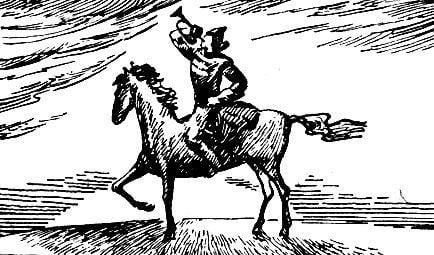
In that hungry year, 1910 left Lukichi and my father, who labored on wealthy relatives. He entered the Morozov locomotive depot as a boilermaker. It was a terrible profession then - boilermaker. Their "grouse" still called. A person will climb into a locomotive boiler, outside they hammer at rivets with a hammer, and he - with his hands, his back, his chest, than he can, these blows restrain. Not work - hard labor. A man will work two or three years - either he will deaf or acquire a heart defect. So it happened to my father later. Though he became an artisan, until the last days he considered himself to be a Lukichove.
He lived in the village of Morozovskaya, and it was time to be called up for active service, ordered him to appear in the military presence at Skosirsky parish.
Only they didn’t take him to the First World War: the medical commission rejected it, his heart failed. But during the civil war he, along with the Lukicevites, fought in the army of Voroshilov, served in the legendary Morozov-Donetsk division, famous for the battles at Tsaritsyn.
Voroshilov in Morozovskaya
From local archival sources it follows: “23 June 1918 of the year in the order of the North Caucasus Military District for the number 4 parts of the 3, 5 of the Ukrainian armies, parts of the Morozov-Donetsk troops and the troops of the Tsaritsyn Front were combined into one group of troops under the command of K .E.Voroshilova. K.E. Voroshilov held a joint party meeting of the communists of the Ukrainian army and the communists of the Morozovsky and Donetsk districts in the village of Morozovskaya. The meeting was held indoors, later occupied by the school. Voroshilov, now - the House of Children's Art ".
By the way, 4 February 2016 marks the 135 since the birth of Voroshilov.
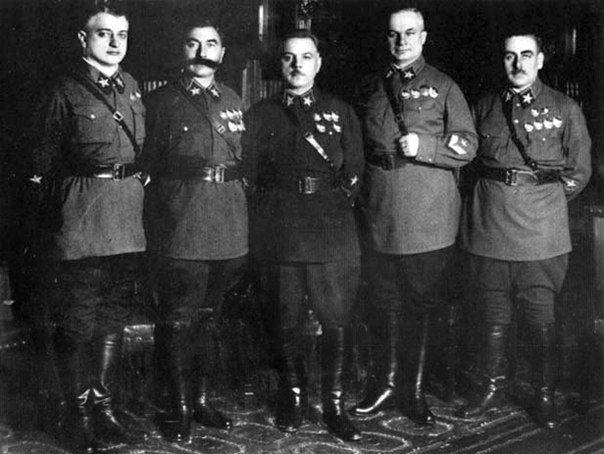
Continuing the quotation: “In July of the 1918 of the year, by order of the North Caucasus Military District, units of the 3 and 5 of the Ukrainian armies were reorganized and united into one division, called the First Communist. Parts of the Morozov-Donets group of troops commanded by N.V. Kharchenko, were reorganized into the Morozov-Donetsk division, the commander of which was appointed I.M. Mukhoperets. In commemoration of the 1 anniversary of the Soviet power, the Morozov-Donetsk division was awarded the Honorary Flag for military service. ”
The Red Army soldier Semyon Molozhavenko handed over to his son budenovku yes two books
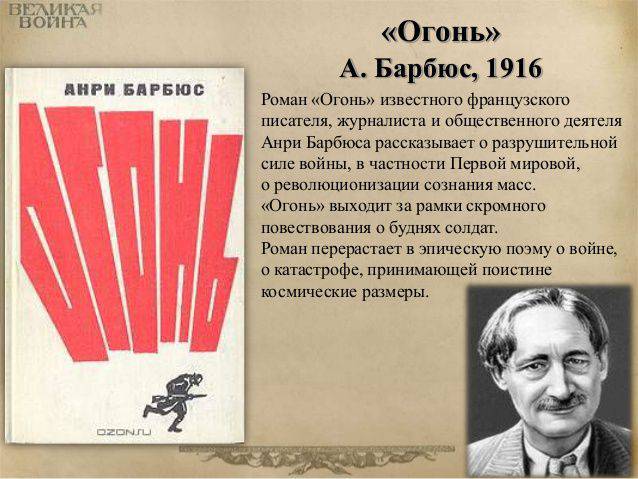
It was Barbus' novel On Fire, published in 1919 in Petrograd. And another, thin brochure, completely without a cover - “Red truth. The work of A. Vermishev. Carefully wrapped in a newspaper, they waited in a locked box of the time when the son overcomes the letter.
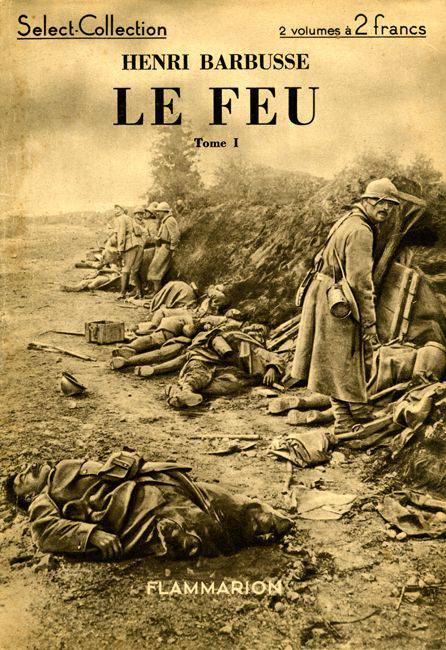
I did not have to wait long. The future publicist learned to read, not yet becoming a first grader. But about this, his father did not know. He died during World War II. “In the Patriotic War, I had a reservation as a train engine, but in the forty-third year he had the opportunity to die from German bombs at the village of Volnoy-Donskoy next to Lukichi,” says the Red Army’s son in the chronicle. - The fascist pilot who hunted a military echelon (his father led him) managed to disable the locomotive. Later, when I came back from the front, the stoker from this locomotive told me how my father, bleeding profusely, eagerly embraced the ground with his cold hands and fell to her with his lips, as if he wanted to gain strength to live and see the dawn that was busy over the Chumatsky wall.
The family archive has preserved several albums with unique photographs of previous years, including photographs taken on the day of the father’s funeral near the smoking room. Many stanichnikov came to say goodbye to this respected man.
The first children's novel about the civil war
On everyday life of schoolboy Vladimir Molozhavenko, his teachers and peers shed light on the materials that are stored in the archives of secondary school No. XXUMX. One of her great 6 graduates of the year was Vladimir Semenovich. According to the teacher stories with 30-year experience V.E. Leshchenko, began to study Volodya Molozhavenko in the railway school named after V.I. Lenin, opened 22 April 1922, in the barracks buildings on the station square of Morozovskaya station.
In November, 1937, the party committee of the Morozovskaya railway station received a project and estimate for the construction of a new school on Krasnoarmeyskaya Street (now Voroshilov) from the Southeastern Railway Administration, since the three buildings of the eight-year school №48 were cramped for 823 students.
On September 1, 1938, children of railway workers, including a teenager, Volodya Molozhavenko, entered the bright and spacious classes of the school built (today secondary school №6). In the article “Chir - Cossack River”, published in the newspaper “Banner of Labor” from 21 in July 1988, journalist I.F. Melnikov will note that “in his books, V. Molozhavenko, at every opportunity, recalls his small homeland. Here and in the book "Chir - Cossack River" he will not forget to tell about the children's hobby for Sholokhov. As a third-grade student, he began to “compose” a novel about the civil war in Morozovskaya, and he soon realized that it was written very “under Sholokhov”. Years will pass: war, work on the railway - until literary creativity becomes the main thing in his life. ”
Bicycle from Kaganovich
Vladimir studied well. This is confirmed by a fact from his school biography, about which his grandson Molozhavenko writes in his essay: “In the fifth grade, Volodya received a bicycle as a gift from people's commissar of communications L.M. Kaganovich.
The Stanitsky history teacher, Vasily Vasilyevich Bogachev, “introduced the pre-war boys to the secrets of gray antiquity. How many paths followed along the native steppe, along the rocky ridges of the Sokolii mountains on the banks of the Bystra creek? ”
After one of these trips, a student of Molozhavenko “composed poems, they were placed in the school wall newspaper:
Igor's squad laid its head in battle,
And we, the descendants, bequeathed this land ... "
Thus, creativity began with school essays, with small notes in the periodical press.
With great difficulty, I managed to find a photocopy of the issue of the newspaper “Bolshevik in Transport” from 15 in April 1937, in which there is a small article “Pioneer detachment without a leader” - a sample of a pen of a capable thirteen-year-old pioneer Vladimir Molozhavenko.
In another issue of the same newspaper from 30 June 1937, the article “Expand the competition among the pioneers” was published.
For many years he was the editor of the wall newspaper “Shkolnaya Pravda” (and, by the way, still the chairman of the student committee, and in 1942-43 years - secretary of the school’s Komsomol committee) ”.
By the end of the 30s, when the civil war in Spain began, "Spanish sweaters came into vogue with a tassel, and all childish games were reduced to a war of" Republicans "with" rebels ", Molozhavenko tells in his book" Secrets of Don Barrows ".
Tell us then: “Will you go to Spain?”, Probably everyone would not hesitate to answer: “I am ready. When?"
And he had to fight. In the first months of the war schoolchildren went on long hikes, rising early in the morning.
In 1941, Vladimir was the secretary of the school Komsomol, the organizer of all possible assistance to the front. His first job is a fireman of a steam locomotive. The guys learned to make decisions, overcome difficulties, prepared themselves for the main exam.
Private infantry
According to the People's Podvig website, Vladimir Molozhavenko was drafted by the Milutino District Military Commissariat in December 1942, from January 1943, the soldier Molozhavenko was on the front line, an ordinary infantry of the 239 Infantry Regiment of the 4-th Ukrainian Front, later commanded a squad. Was injured.
Victory Day met in Czechoslovakia, in Prague, where the battalion's Komsomol Commander Senior Sergeant Molozhavenko participated in the May parade.
Vladimir Semenovich was awarded six combat medals and the Czechoslovak Order "Guerrilla Star".
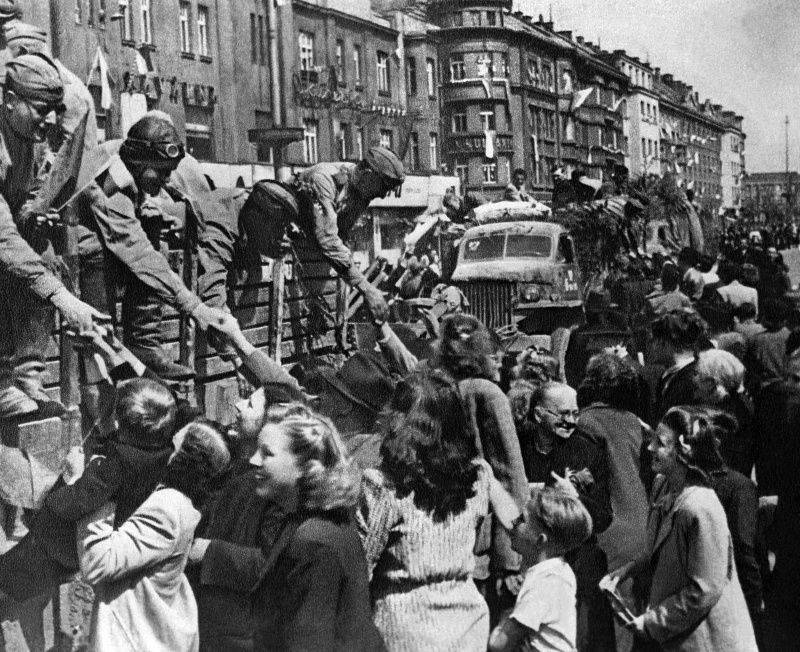
Soldier's share of my peers
In an article titled “Holy Memory,” published in the Znamya Truda newspaper from 17 February 1995, war veteran Vladimir Molozhavenko talked about what his peers and soldiers were like: “According to severe statistics, the heaviest damage in the last war fell to the lot my peers, those born in the twenty-fourth and twenty-fifth years. Of every hundred boys, only three returned from the front. And how many still died after the war from front-line wounds and ailments. The war shards are stubbornly catching up with those who survived after May 1945. When the war began, all of us, by hook or by crook, sought to get to the front. I remember well how already on Sunday, the twenty-second of June, the residents of the village of Morozovskaya literally stormed the military enlistment office, demanding to send them immediately to the front. And the young guys, who had not yet reached military age, and the old men who had attached the crosses of St. George to this place, that they had hidden in a secluded place for many years, and the women - they all tried to convince the military commissar that he could not, had no right to refuse them. They came to the recruiting station with their families. By the evening of that day, a fighter battalion was formed in the village - in case of an enemy landing, and his fighters, who were still in training weapons and hunting shotguns. We, boys, were swept away on different fronts. Only by chance, from letters from relatives, we learned about the fate of our comrades. Even less often it was possible to send greetings to each other - the numbers of the field mail changed very often. We stepped into the war because of school desks, unrecognized, disliked, and sooner, too early became adults, responsible not only for their own and their loved ones fate, but also for much more - for the fate of the Motherland.
None of us was born a soldier, but we became them. Very much that we all were prepared for, we just could not know. They did not know and did not know how. They didn’t know the range of the enemy’s mines, didn’t know that at night the Nazis would light up the front line with rockets, that, apart from the wire barriers, the Germans would surround their leading edge with tin cans on a wire: by chance they would hit the machine-gun fire. At first, and every bullet bowed when she whistles over her head. Then they began to realize that the bullet that whistles is not yours, but yours will silently appear. They knew about the enemy unpardonably little, and paid for their lack of knowledge with their lives.
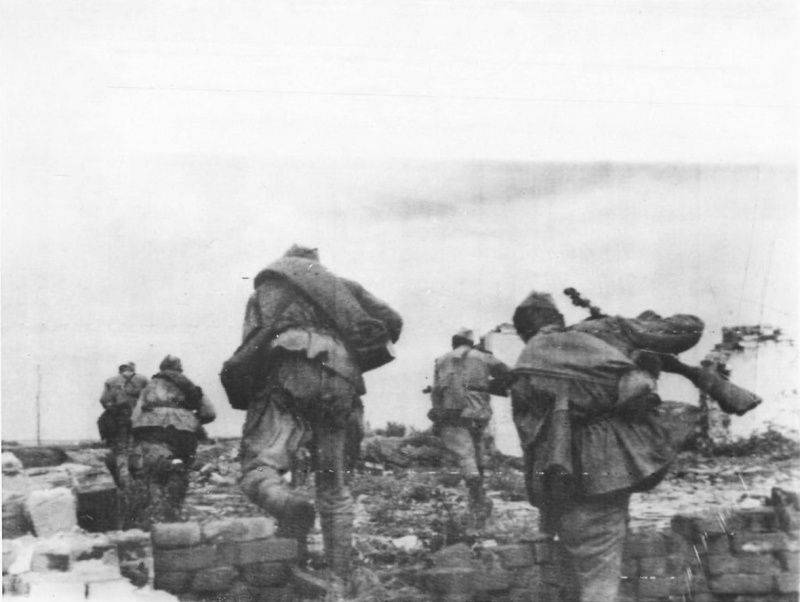
The war made us adults. And fear, and duty, and the ability to die at any moment - everything was real. And yet - now it is not a shame to admit it - we remained at the front as boys who could not indifferently miss the views of the girls.
But they could not accept the girls to “command” us, even the wounded. And boyishly, contrary to common sense, we ran away from the medical battalion, sometimes from the hospital again to our unit, again to the battle, for many of us the last one. The war has become the most important page in our biographies. From the youth of the front, the unblinking eyes of friends who have not returned from the battlefields look at me. They look attentively, with predilection, even with the distrust of some unspoken expectation, as if asking whether I remained true to the front-line fraternity. This memory, perhaps even more than to the past, is an appeal to the future. God forbid to lose it to us!
I count on my fingers my peers who have returned from the war, and I involuntarily think: indeed, the best, most talented of us have died the death of the brave. There is no such family in my native village of Morozovskaya, as in all of the Quiet Don, in the whole vast country, wherever they cherish the memory of those who died in a fair fight for a just cause. Many times I saw portraits of my peers in the farmhouses who did not return from the war. Twined with dry immortelle flowers and embroidered towels, they are both more expensive and closer to heart than darkened icons. I saw how mothers keep treasured triangles of the last filial letters with half-erased front addresses in old chests. Even having received a funeral, they believed that their sons were alive, that they would return.
Having survived the war, I remained indebted to my peers who died in battles. Did you know that of all the 1924 and 1925 boys, only three percent returned from the war? How could I not tell about the land on which they grew, dreamed, made plans, and then became soldiers on the same land? Therefore, all that I managed to write is, above all, the memory of the war, of my fellow soldiers and peers. ”
The theme of the Civil and Great Patriotic War sounds in many books of Molozhavenko. She is dedicated to the works "When the lightning flashed ...", "The Ballad of the Commissioner", "Peers", "The bonfires of memory", "Hot Sun of Surkhan" and others. The last book of the prose writer “For All One Victory” is a vivid documentary evidence of the heroism of the soldiers and the anti-fascist underground.
Throughout his life, the writer tried not to lose touch with fellow soldiers, was interested in destinies and searched for them, devoted chronicles to representatives of that generation of brave and courageous people.
But the front-line comrades did not forget about it either. The republican newspaper “Vatan” from 15 in May 2012 published an article prepared by I. Mikhailova, entitled “There are no warriors of the past”, which states that after 25 years after 1944, the same age as Don writer, a native of the city of Derbent Ilizir Illyageyev, born in the city of Derbent. tracked down his front-line friend, Vladimir Molozhavenko.
According to the spouse of Vladimir Semenovich Lyudmila Sergeyevna Molozhavenko, in the memorable 1969 year, in July, Molozhavenko visited together with high school students of pre-war years, with whom he studied in his native school, in Volgograd, on Mamaev Kurgan, which became a symbol of the fate of that generation.
Molozhavenko will write about this article entitled “Appointment with Youth”, published in the newspaper Komsomolets (Rostov-on-Don).
The author will also begin with memories of the war years: “Our youth was disturbing, our exam was severe in life. Not everyone had the opportunity to return from the war. The names of dead peers and teachers who laid down their heads on the battlefield were called with bitterness. It was in Volgograd that almost each of us had the opportunity to drink and the bitterness of the first, heavy losses, and see our first joys. We studied at the Morozovskaya Lenin Secondary School, and the road was in Stalingrad. They went here before the war on excursions during the holidays and amateur shows, went from Morozovskaya herself to militarized campaigns (it happened, on skis, and on foot - in gas masks). School football players from the Anton Kandidov team went to Stalingrad for competitions. In the Stalingrad Museum of the Defense of Tsaritsyn kept photos of our fathers. And the trains with conscripts went in forty-first from Morozovskaya to Stalingrad. We were gathered a little - not everyone managed to find them, and there were already a few of us left who joined the Komsomol in the thirty-seventh, thirty-eighth, thirty-ninth years ... And it was difficult to hold back mean tears when you were embraced by your old school friend. Nothing, that gray hair has strewn heads and wrinkled, cut faces - the heart, like thirty years ago, has remained young, it has not changed the old friendship. ”
Always love work, always learn
After demobilization, Molozhavenko decided to follow the example of his father, settling down to work as an assistant engineer of a locomotive at the depot at Morozovskaya station. But the railroad worker did not work long. In 1947-48, he studies in the tenth grade of the evening school for working youth at the same railway school, in the Higher Komsomol School of the Central Committee of the Komsomol. In the same period his long-standing dream of journalism is fulfilled. Vladimir Semenovich continues his studies at the editing department at the Moscow Correspondence Polygraphic Institute (now Ivan Fedorov Moscow State University Press), and after graduating from the university in graduate school with him and at the same time, from 1947 to 1951, he works as a responsible secretary in the regional newspaper "Morozov Bolshevik" Released from 1920 year.
Vladimir Semenovich emphasizes: “This was the beginning of my journey to journalism. Working in a newspaper helped me become a professional writer. ”
Here he expressed an interesting thought about choosing a profession: “I love my profession, I consider it interesting. Profession writer - in general, rare. The journalistic profession is more common. But I am afraid to advise graduates of the school to choose for themselves the profession of a writer. The fact is that no institution can make a person a writer (as, incidentally, a journalist). Becoming a writer, like a writer, helps a person's life experience. Equally important (if not the main) importance is also talent, inclinations, already manifested in childhood, adolescence. Nothing comes without difficulty. And therefore my advice to those who graduate from school is to always love work, always learn. ”
Young correspondents, front-line soldiers in sweat-wet gymnasts
According to the recollections of Valentina Mikhailovna Chalova, Vladimir Semenovich was "a very restrained, modest and responsible person." In the home library of Valentina Mikhailovna there is his book “Secrets of the Don Barrows”.
V.P. Koshelnikova notes that "diligence literally" oozed out "of this good-natured intellectual with a firm, truly male character, professional in his field, which today is very small."
L.P. Seed remembers how ardent 23-25-summer front-line soldiers Vladimir Molozhavenko, Vasily Tkachev, Konstantin Rychkov, Alexander Polyakov, Mikhail Khokhlachev worked with eagerness, despite the difficulties of the post-war years, when it was not alone that had to constantly search for materials about people of labor a dozen kilometers of the way.
Young correspondents, including an energetic blond guy (Molozhavenko), were returning to the office in sweaty sweatshirts, in dust, sometimes in the mud, but happy and contented with themselves, with lots of ideas and impressions from working with the workers and collective farmers.
Vladimir Semyonovich was respected in the team, and he always treated his colleagues and brothers with respect and attention, even after many years.
He dedicated his book "The Bonfires of Memory" to four front-line writers who had not returned from the war - Busygin, Katz, Shtetelman, Gridov.
Another such example is indicative. According to the story of L.N. Tulinova, once to the Don writer who was already quite famous in 90, was asked by her late father Nikolai Prikhodko, a native of the Pridchensky farm of the Milutinsky district, author of such literary works as “Khutoryan”, “The Chronicle of the Milutinsky Krai”, “Ancient Cossack Genus ". Local historian asked to read his new book "Mankovskys were" and give a review.
Vladimir Semenovich vividly responded to this request by Prikhodko with a letter of feedback from 1993 of the year sent from Rostov-on-Don. There are such lines in it: “... I am sincerely grateful to you for“ Mankovskys were ”. I read with pleasure, secretly even envied ... Your pen is to my liking. ”
In 1951, the 27-year-old journalist moves to the city of Rostov-on-Don. Having devoted a quarter of a century to journalism in the regional newspapers "Bolshevik Shift" ("Komsomolets"), "Molot" and the city newspaper - "Vecherny Rostov", where he worked as an executive secretary until 1966, Vladimir Semenovich becomes a professional in his field.
This is confirmed by the words of his friend-compatriot Ivan Melnikov, said in the article “V.S. Molozhavenko - 60 years ", which appeared in the" Banner of Labor "on 27 December 1984, on the eve of the writer's birthday:" Under the clever, talented hand of an industrious journalist, these newspapers acquire an attractive appearance, high literary finish, and Vladimir Semenovich's speeches in the press, his journalistic materials, local history essays are becoming more and more significant, affecting the most important aspects of our life ".
In 1966-70, V.Molozhavenko works as director of the Molot publishing house, since 1970 he is a member of the editorial board and head of the essay and journalism department of the Don magazine.
“Nature has endowed Vladimir Semenovich not only with a subtle perception of the world, but also presented us with the ability to communicate, to find interesting people, who at the first meeting take him for a loved one, trust him.”
Judging by the opinions of those who at least once met with Vladimir Semenovich or corresponded, he was really open to communication, able to find a common language with people of different ages, intellect and social status.
According to the recollections of Svetlana Ukraintseva’s niece, “the uncle always tried to help his mother and grandmother, often came to his home, loved to joke, and in his separation he wrote very interesting, heartfelt letters, often with poems, in clear, simple language.”
Special, kindred warm relations were with Vladimir Semenovich with a cousin, also a graduate of the railway school. Lenin Afanasy Vasilyevich Molojavenko, art teacher.
A talented relative left many books of his own for the memory of his brother Afanasy. Some of them, including the “Burning Bush” with the inscription “To a childhood comrade, an inflexible football player from the Anton Kandidov team, a teacher of future bogosovs and just a relative Afon Molozhavenko. from the author - with respect. 8.06.1975 ”, are now in the Morozov Museum.
A few more works (“Don were” with the inscription “I did not“ compose ”anything and did not invent it,” I heard everything written in it from the old men of the village, and therefore all this is on their conscience, and forgive them for 1970 ”,“ Sunrise Ticket ”with the inscription“ Brother Afon “Mazay” - with a good memory of our childhood, barefoot in a village. 10.1990 ”), left in the house after the death of father Afanasy Vasilyevich, was shown by his son Vladimir.
Go to the farm "Verbochki"
Afanasy Vasilyevich took part in all the meetings of the writer in the days of his stay at home, as evidenced by the photos. Practically in every picture, among friends, graduates of the native school, readers, next to Vladimir Semyonovich brother and at the same time a close childhood friend Athanasius. Be it a meeting with fellow countrymen in the club. V. Miroshnichenko at the reader’s conference on the book of the writer-compatriot “When the lightning flashes were raging”, either with the former students of the Lenin railway school, or with the Verbochansky school team and residents of the Verbochka farm, or at a rest in the Rostov sanatorium.
Fleeing from the hustle and bustle of the city, Molozhavenko often came to the Verbochki farm, to another close friend of his youth, SF Nakonechnikov. The records of Stepan Fyodorovich are preserved in the archives of the Verbochanskoy school: “I don’t have enough words to explain how much our conversations were for me together. How much information Vladimir Semenovich had in all subjects. How fascinating and animated he was when he revealed to me, so to speak, to unscrew his dreams and the secrets of his future creations, or when he understood what he had written. ”
The inscription left after the next 10 arrival on August 1977 of the year by the Molozhavenko brothers (Vladimir and Afanasy) on the donated book of the Don writer Gretsmith Manych is also interesting. Journey from the Don to the Caspian. "
Vladimir Semyonovich wrote on one page: “To the literary circle of the Verbochansk school - with the author’s good wishes”, and next, to another, Afanasy Vasilyevich: “To a colleague - teacher, colleague - veteran of the Great Patriotic War, friend of youth and great book lover Stepan Fedorovich Nakonechnikov”.
What is called one capacious word Homeland
In one of the letters to Verboman schoolchildren, Vladimir Semenovich shared with the guys a dream to write about the farms and farmers who lived and lived around the village of Morozovskaya, residents of the yurt: “I confess I have been working on this book for a long time. I will tell in it about your compatriot, my childhood friend Stepan Fedorovich Nakonechnikov, and about other workers of the village. ”
The last time comrades saw 10 October 1981 of the year. After this trip, Molozhavenko will write the novel The Last Nightingale and include it in the collection Sunrise Ticket.
It was possible to find the inhabitants of the farm, whose information greatly expanded the idea of a truly creative person. For example, L.A. Ukraintseva told about the meeting of the members of the literary circle "Petrel" with V.S. Molozhavenko, held in 1981 year: “The impression remains truly indelible. We enjoyed reading the writer's books and corresponded with him. But when he came to the school and told about himself and his work, we were filled with special respect for him. We naively believed that everything in books, from beginning to end, was made up by the author. It turned out that Molozhavenko did not invent anything, did not compose. All his works had a documentary basis. ”
Participant of that meeting, O.F. Taekina said: “That day there was not enough room for everyone in the cozy corridor of the school. Fans of literature, satisfied that they were able to get there, stood joyfully excited and happy along the walls. Vs Molozhavenko talked about how he loves to write about the Don land, which flourishes and grows rich from year to year, about the free Cossack region and its glorious sons who are rebuilding life in a new way, about the valiant work of drummers on collective farm fields and sees around what is called one capacious word Motherland.
Literature teacher N.I. Matsegorova, who worked at that time, remembered the words of the writer, confirming the idea of the indissoluble connection of the writer's work with his native land: “... I thought, I thought, and it turned out that I need to tell about my countrymen. They were interesting to me and loved by me as they really are. ”
The testimony of warm meetings with teachers and schoolchildren can be called the books presented by the writer from the heart “to the young friends of the Workers with kind wishes in the search and in all matters”, to the head of the “Literary study of local lore” circle philologist Lyudmila Nikolaevna Svizhenko and other teachers.
His works “Morozovsk”, “From Ivan-lake to the Sea of Azov”, “Hot Sun of Surkhan”, “He was with me among the Don” are still in a prominent place in the Russian language and literature class of the Verbochansk school and serve as a great help on the lessons literature
The writer is also devoted to the stand “Searches and Finds, or a word about a fellow writer” with the heading “A man with eyes wide open and a watchful heart”, which perfectly characterizes his inner world.
Bring me the smell of wormwood
About how much the native land was to the writer, says one more fact. In 1984, in a regular letter, he invited pupils of the senior and middle classes of the Verbochansk school together with a teacher of literature Lyudmila Nikolaevna Svizhenko to visit him, in Rostov-on-Don. At the same time, he asked the guys to bring a “bouquet” of wormwood: “I was very much yearning for the smell of the steppe”.
Ten girls, members of the literary study of local lore school circle, were delighted with this invitation and for a long time could not believe that they would visit the writer himself! They picked wormwood in the steppe, wrapped it in a paper bag and, together with their leader, Lyudmila Nikolaevna, went to meet with a famous countryman.
Hospitably meeting young Verbian friends in his house, the first thing Vladimir Semenovich asked the children was whether they brought wormwood with them. Schoolgirls handed over a paper bundle. How a writer was delighted with the gift! Dipping his face in a fluffy "bouquet", he eagerly inhaled the smell of fresh wormwood, presenting himself in his native steppe expanses.
My fatherland
Over the years, communicating with readers, young and old, a prose writer will often talk about what to write led his life: “A lot of meetings, a lot of impressions, a lot of different, pleasant and unpleasant events - all this was postponed, somewhere on the sly, until asked outside. " And one, perhaps the most important of all this - love of country.
Vladimir Semenovich wrote: “My fatherland ... There is no such bird that could fly around it, and at the same time it fits in the human heart, lives in it with love and memory. And each has its own: an old willow by the pond, an oak broken by lightning, a quiet Moscow courtyard or a steep river over the Don. Thank you, Don, that you are on earth! Thank you, native land, for everything that you have given me in life. ”
Vladimir Semenovich Molozhavenko was awarded the Order of the Patriotic War of the II degree, the medal "For Military Merit", the medal "Guerrilla Star" (Czechoslovakia), the medal G.K. Zhukov.
Author of books: “When the lightning flashes blazed” (1966), “Secrets of the Don Barrows” (1967), “Peers” (1970), “Blue Springs” (1971), “The Treasured Box” (1973), “The Burning Bush” (1974), “ A Tale of the Quiet Don ”(1976),“ Enchanted Donets ”(1976),“ Rattlesnake Manych ”(1977),“ Red Officers ”(1977),“ Meeting with the Donets ”(1979),“ Password “White Rose” (1979 ), “Morozovsk” (1981), “Surkhandarya is my brother's land” (1981), “Hot sun of Surkhan” (1982), “Roads led to Prague” (1985) and others.
Information